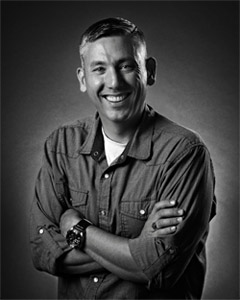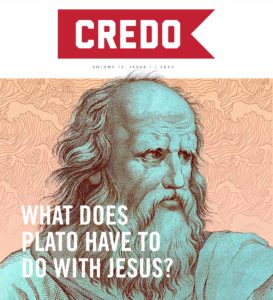Philosophers are lovers of wisdom. As Proverbs instructs, true philosophers must ground wisdom in the fear of the Lord (1:7). But the philosopher must never move past this foundation. The fear of the Lord must pervade all philosophy for a Christian to truly contemplate the good, beautiful, and true. Only then may Christians sing the words of David in Psalm 27:4,
One thing have I asked of the Lord,
that will I seek after:
that I may dwell in the house of the Lord
all the days of my life,
to gaze upon the beauty of the Lord
and to inquire in his temple.
In this interview, Credo Editor Lance English poses 10 questions to Dan DeWitt covering philosophy, apologetics, and the arts.
D an DeWitt is the Director of the Center for Biblical Apologetics and Public Christianity and Associate Professor of Applied Theology and Apologetics at Cedarville University. He previously served as Lead Pastor of the Campus Church and as Dean of Boyce College. He is the author of numerous books including: Life in the Wild: Fighting for Faith in a Fallen World (The Good Book Company, 2018), Christ or Chaos (Crossway, 2016), and Jesus or Nothing (Crossway, 2014).
an DeWitt is the Director of the Center for Biblical Apologetics and Public Christianity and Associate Professor of Applied Theology and Apologetics at Cedarville University. He previously served as Lead Pastor of the Campus Church and as Dean of Boyce College. He is the author of numerous books including: Life in the Wild: Fighting for Faith in a Fallen World (The Good Book Company, 2018), Christ or Chaos (Crossway, 2016), and Jesus or Nothing (Crossway, 2014).
1. You’ve written a thing or two about Christian apologetics. How did you first become interested in apologetics?
My introduction to apologetics was one of necessity. As a junior in Bible College, I was facing questions and concerns of my own. Several friends from childhood had walked away from the faith and I wasn’t sure how to best respond. Not only was I unsure of the best answers, I had lingering doubts about whether or not there were good answers to be found.
I took a course in apologetics as an opportunity to spend more time thinking about why I believed what I did. My professor was a gentle person with a pastoral approach to doubt and doubters. I loved the class. It all started there. Over the years I’ve continued a steady diet of authors who model how to make a winsome case for the Christian faith.
2. The theme of this issue is Christian Platonism, which is one of the pillars necessary for a classical understanding of Christian Theology. How do you teach metaphysics to your students and what value does philosophy serve in the realm of apologetics?
I used to teach an introduction to philosophy course at Boyce College. I would always take my students to a local cemetery for the first lecture. This was quite an ordeal as the class was usually over seventy students.
I would ask the students why philosophy mattered. After listening to their responses, I would suggest that philosophy matters because it is humanity’s best attempt to answer questions that have expiration dates. Every person has a limited amount of time to figure out what matters most, what’s really real, and how to pursue a good life. I would point to the headstones around us and say, “That’s her expiration date.” Pointing to another, “That’s his expiration date.”
Philosophy is the discipline of taking these questions seriously. I like to tell my students that their view of metaphysics frames all that follows, from epistemology to axiology. Understanding these categories and how they relate one to another is crucial for talking about the Christian faith in the marketplace of ideas. An atheist is more likely to be converted by an ambush of the heart than an argument of the head. Click To Tweet
3. You served in a variety of academic and pastoral roles prior to starting the Center for Biblical Apologetics and Public Christianity at Cedarville in 2016. How did those earlier seasons prepare you?
The most transformative experience for me was starting and leading a campus for my church in Louisville, Kentucky. My pastor asked me to help launch a new campus that would target the community on and around the University of Louisville. We met on the university campus in a building called the Red Barn. Those who were far from the Christian faith would regularly attend. Instead of any sort of invitation, we closed every teaching time with Q&A.
This experience helped me understand both the potential and limits of apologetics. It also was a crash course in realizing I’m not an expert on every topic and shouldn’t pretend to be. Nonetheless, my confidence in the Christian worldview to account for reality only deepened. I think if it weren’t for that experience, I would be much more tempted to offer cookie cutter answers to complex questions, or to look at contemporary topics in a way that is isolated from concern for real people.
4. You are an avid sketch artist, drawing literary giants and their beloved worlds and characters. How did you get into drawing and how has your faith inspired your art over time?
My junior year of high school a small women’s organization in my hometown awarded me a scholarship to attend a summer art program at Eastern Illinois University. I loved every minute of it. But when I left for Bible college a year later, I felt the creative chapter of my life was closing. It took me a long time to feel comfortable talking about my artistic ambitions again. It was G.K. Chesterton who liberated me to put down a textbook and pick up my sketch pad. There’s a time for both. There is glory in both. Though I consider myself a mere amateur artist, I find great joy in sketching.
5. While we’re talking about Christianity and the arts, why is it worthwhile for the Christian to pursue the arts, even if that’s not his or her area of expertise?
Francis Schaeffer once said that it is the Christian whose “imagination should soar beyond the stars.” I can’t help but think of Dorothy Sayers’ poem “The Makers,” which reminds us that our creativity is a reflection of our Creator. Art can show both how the world is and also how it should be. As Christians, we have a deep well to draw from for both. In so doing, Christians are able to point people to the very nature of reality itself, and to the end of all things, and illustrate the power of the gospel to speak to our deepest longings.
Peter Hitchens, brother of famed atheist Christopher Hitchens, makes a simular point in his book The Rage Against God: How Atheism Led Me to Faith. To paraphrase Christopher, an atheist is more likely to be converted by an ambush of the heart than an argument of the head. C.S. Lewis used imaginative writing to steal past ready made rational defenses to the faith, what he described as “watchful dragons.”
6. What do you enjoy doing when you are not teaching, drawing, or writing?
Outside of getting to hang out with my family, there are few things I enjoy more than standing in a cool stream on a warm day with a fishing pole in my hand. I’ve taken all my kids into the streams around our house to explore and fish. I love the outdoors. I find more joy in G.K. Chesterton than any of the other authors often referred to as the “Inklings.” Click To Tweet
7. Why do you love teaching in a liberal arts setting, and how can Christians better support and encourage the liberal arts going forward?
What drew me to Cedarville University was the opportunity to teach students going into a number of careers. Very few of the students I teach are Bible majors. Most of them are studying engineering, education, nursing, teaching, psychology, or pharmacy. I believe the Christian worldview offers a unique foundation for human flourishing, and a liberal arts education gives students ample opportunities to contribute to society so that others might see their good deeds and glorify their Father who is in Heaven.
8. I hear you are a big fan of coffee. So much so, in fact, that you’ve held a weekly breakfast meeting with students called, “Mere Caffeination.” If you could sit down for coffee with one of your theological heroes, who would it be and what would you discuss?
If I had to pick just one, it would be C. S. Lewis. None of my students would be surprised to hear that. I would just want to hear Lewis talk about his love for the Lord and for people. I have access to his thoughts on so many topics in his literary corpus and his published letters. I would want to get beyond arguments, I would just want to hear his heart. I stood at his grave a few years ago and thanked the Lord for Lewis’s legacy and influence in my life. I would begin by thanking Lewis in person.I hope students leave my course with the impression that theism best explains reality, and Jesus best explains theism. Click To Tweet
9. You’ve spent quite a lot of time with literary giants such as C. S. Lewis, J. R. R. Tolkien, and G. K. Chesterton. If you could pick only one of them to read for the rest of your life, who would it be and why?
This would probably surprise some friends and students. I would pick G.K. Chesterton. While he sometimes frustrates me in how he often takes the scenic path to make a point, I find that I return to his writings and therein find more joy than any of the other authors often referred to as the “Inklings.”
10. What is one thing you want your students to remember about you?
I hope my students never forget the power of the gospel to make sense of life. I often tell them the Christian worldview is not overshadowed or overpowered by any rival truth claim. I believe that. I hope students leave my course with the impression that theism best explains reality, and Jesus best explains theism. I hope that’s an impression that sticks with them through the thick and thin of life.


